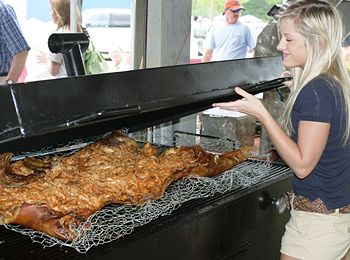Pig (domestic): Difference between revisions
imported>David L Green (add photo) |
imported>Caesar Schinas m (Bot: Update image code) |
||
| Line 3: | Line 3: | ||
The '''domestic pig''' or '''swine''' is a mammal native to [[Eurasia]], now an important food animal in nearly every part of the world. Pigs were first domesticated in prehistoric times. They were brought to the [[Americas]] by European settlers, and to [[Oceania]] by the [[Polynesian]]s. In North America [[DeSoto]]'s men drove herds of them as they traversed the southeastern USA. Some escaped and became [[feral]], where they quickly became a favored game animal for Native Americans. | The '''domestic pig''' or '''swine''' is a mammal native to [[Eurasia]], now an important food animal in nearly every part of the world. Pigs were first domesticated in prehistoric times. They were brought to the [[Americas]] by European settlers, and to [[Oceania]] by the [[Polynesian]]s. In North America [[DeSoto]]'s men drove herds of them as they traversed the southeastern USA. Some escaped and became [[feral]], where they quickly became a favored game animal for Native Americans. | ||
{{Image|Pig pickin 5762.JPG|right|350px|Slow-cooked, whole hog, pork barbecue is a traditional food in Southeastern USA.}} | |||
Nearly every part of pigs is eaten: the flesh produces [[pork]] and [[bacon]], ribs become [[spareribs]], and even [[pigs' feet|the feet]] are eaten. Pork is especially important to [[Chinese cuisine|Chinese]] and [[Polynesian cuisine]]. On the other hand, [[Judaism]] and [[Islam]] ban the eating of pigs or any other use of them, probably because of ancient encounters with [[trichinosis]]. | Nearly every part of pigs is eaten: the flesh produces [[pork]] and [[bacon]], ribs become [[spareribs]], and even [[pigs' feet|the feet]] are eaten. Pork is especially important to [[Chinese cuisine|Chinese]] and [[Polynesian cuisine]]. On the other hand, [[Judaism]] and [[Islam]] ban the eating of pigs or any other use of them, probably because of ancient encounters with [[trichinosis]]. | ||
In addition to trichinosis, pigs are a major transmitter of [[influenza]] viruses to humans. | In addition to trichinosis, pigs are a major transmitter of [[influenza]] viruses to humans. | ||
Latest revision as of 08:44, 8 June 2009
The domestic pig or swine is a mammal native to Eurasia, now an important food animal in nearly every part of the world. Pigs were first domesticated in prehistoric times. They were brought to the Americas by European settlers, and to Oceania by the Polynesians. In North America DeSoto's men drove herds of them as they traversed the southeastern USA. Some escaped and became feral, where they quickly became a favored game animal for Native Americans.
Nearly every part of pigs is eaten: the flesh produces pork and bacon, ribs become spareribs, and even the feet are eaten. Pork is especially important to Chinese and Polynesian cuisine. On the other hand, Judaism and Islam ban the eating of pigs or any other use of them, probably because of ancient encounters with trichinosis.
In addition to trichinosis, pigs are a major transmitter of influenza viruses to humans.
